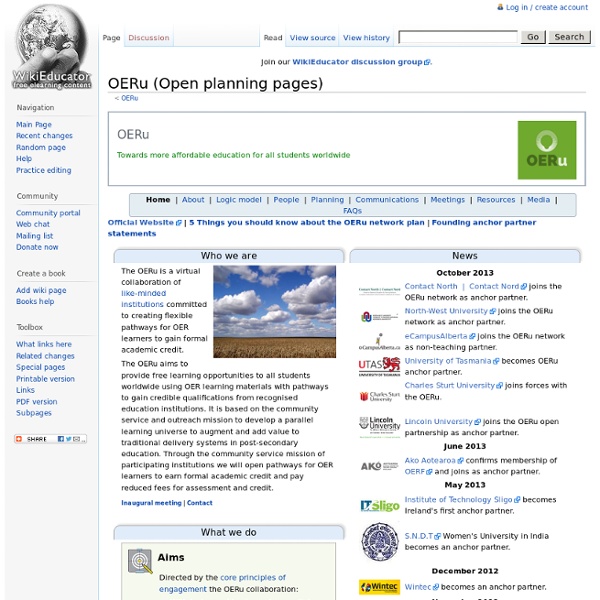



http://wikieducator.org/OERu/Home
50 Excellent Open Courses on Teaching With Technology The information below is taken from a recent posting on www.onlinecollegesanduniversities.com. It is a listing of 50 free online courses that are offered on a wide variety of instructional technology topics. The courses are free, self-directed, and accessible over the internet. OCW Advanced Course Search Where can I find open textbooks? Here are some of the open textbook projects where you can start browsing. Openstax offers free and open textbooks for colleges. You can see the list of institutions that are using openstax textbooks here. You can also find textbooks at BC Campus Open Education site.
EPIC 2020 Link to the Udacity web site Latest article about Udacity. Udacity is the result of an experimental Stanford Engineering online class that was conducted at the end of 2011 by Sabastian Thrun (Research Professor of Computer Science at Stanford) and Peter Norvig (Director of Research at Google). Student Research: Can Googling Replace $168 Intro to Psych Textbook? Electronic Textbooks | News Student Research: Can Googling Replace $168 Intro to Psych Textbook? By Dian Schaffhauser02/16/11
Web Design.edu: Top 50 Free Open Courseware Classes to Design Better Web Sites Are you are a self-taught Web designer? Or, are you a visual communications graduate with a degree? No matter your level of education, you know that Web design is an ever-changing field. Software changes, accessibility demands, usability concerns and platform incompatibilities all contribute to the demand for constant learning curves.
Free. Open-source. Peer-reviewed. High-quality textbooks for your college course. - OpenStax College Free. Open-source. Peer-reviewed. Spotlight on E-Learning Education Week's Spotlight on E-Learning brings together a collection of articles hand-picked by our editors for their insights on: Understanding different models of online learningChoosing the right e-learning companyIncreasing access and equity in digital learningHow elementary schools incorporate e-learningParental involvement in online educationWhat works best for classrooms that blend face-to-face and virtual learningNew standards outlining online-course design Elementary school online students need remediation or acceleration at junctures in their development some say are more crucial than any in high school.
Free Online Thai Lessons: TCU Open Courseware Chiangmai University Open Courseware… TCU’s Open Thai Courseware: What a brilliant find by Kokesat, a member of the ThaiVisa Thai language forum! Quoting SoftWater: I don’t think I’m overstating the case (?) when I say this is the BEST beginners material I have ever seen. This is going to be my first recommendation to anyone who asks me how to start learning Thai. Imagine No College Debt (It Isn't Hard to Do) - Sophie Quinton Traditional universities could soon be forced to accept credits from online courses. Associated Press/Jessica Hill Making it in America used to mean earning enough to send your kids to college. These days, it requires getting a degree yourself first--and then possibly upgrading your credentials and skills to qualify for a promotion or to switch fields.
Open education Open education is a collective term[1] to describe institutional practices and programmatic initiatives that broaden access to the learning and training traditionally offered through formal education systems. The qualifier "open" of open education refers to the elimination of barriers that can preclude both opportunities and recognition for participation in institution-based learning. One aspect of openness in or "opening up" education is the development and adoption of open educational resources. Institutional practices that seek to eliminate barriers to entry, for example, would not have academic admission requirements.
Building Dynamic Websites / OpenCourseWare This is OpenCourseWare. Computer Science E-75 is a course at Harvard Extension School. Even if you are not a student at Harvard, you are welcome to "take" this course via cs75.tv by following along via the Internet. (The course's own website is at www.cs75.net.)
Digital Special Collections Projects DSC has taken on a number of projects to grow the OAC, Calisphere, and UC Shared Images collections; bring on new contributors; explore opportunities for developing and implementing new technologies; and much more. Current projects UC Libraries Digital Collection (UCLDC) Implementation Project The UC Libraries Digital Collection (UCLDC) Implementation Project is a collaborative initiative of the ten campus libraries that will result in a shared platform for managing and displaying selected digital resources. It will reveal the strength and breadth of the UC Libraries' combined digital collections to end-users, while providing a streamlined underlying technical infrastructure for campus libraries to manage and surface content. The implementation phase is a two-year project to install and configure a shared digital asset management system, harvest externally hosted content, and build a public interface.
15 Ways To Become A Better Self-Learner 10 Ways To Become A Better Online Learner 5.68K Views 0 Likes There are some quick and easy ways to become a better online learner. Whether you're taking a class or just researching, here are the DOs and DON'Ts.